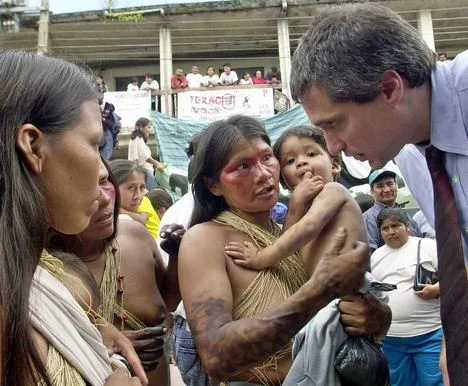Chevron Oil targets U.S. attorney who won a judgment against the company for Ecuadorian villagers
By the Amazon Defense Coalition
After being caught paying a witness who lied to a U.S. federal court, Chevron is now trying to bankrupt the human rights attorney who helped ind igenous groups win a $12 billion environmental judgment against the company for creating widespread destruction in the Amazon rainforest of Ecuador, according to legal papers filed this week.
igenous groups win a $12 billion environmental judgment against the company for creating widespread destruction in the Amazon rainforest of Ecuador, according to legal papers filed this week.
The attorney, Steven R. Donziger, has condemned Chevron’s unprecedented motion to collect $33 million in fees as “illegal and unethical” and said it amounts to a SLAPP-style harassment attempt to thwart efforts to protect the rights of the indigenous groups that won the historic judgment. After an eight-year trial, Chevron in 2011 was found by three layers of courts in Ecuador to have dumped billions of gallons of toxic waste into the rainforest, decimating indigenous groups and causing an epidemic of cancer that has killed or threatens to kill thousands of people.
Donziger’s legal submission opposing Chevron’s fee motion is here.
“The bottom line is that Chevron CEO John Watson is furious that the indigenous groups his company poisoned beat him in court, so he ordered this retaliation against me in the United States given that I am one of their lawyers,” said Donziger, who works in Manhattan while coordinating with counsel from Ecuador, Canada, Brazil, England, and Argentina. “I’m a surrogate for attacks against thousands of vulnerable indigenous people in Ecuador whom Chevron refuses to compensate for causing life-threatening harm, despite court orders that it do so.”

Steven Donziger meets with Amazon villagers in 2012.
Separately, Greenpeace Founder Rex Weyler – an internationally renowned writer, author, and activist who lives in Canada — published a devastating article over the weekend that was unsparing in its criticism of Chevron’s criminal misconduct in Ecuador. Canada is one of the countries where the Ecuadorians are trying to seize company assets to pay for their clean-up.
“This tragic story reveals almost unthinkable corporate irresponsibility, intimidation, and arrogance, not just by Chevron executives, but by their 60 law firms, 2,000 lawyers and paralegals, six public relations firms, squads of private investigators, thugs and bribed witnesses, and at least one severely compromised U.S. judge,” wrote Weyler. “Chevron has probably spent more money trying to weasel out of this case than any corporation in world history.
“If we sometimes wonder why significant ecological progress appears so monumentally difficult, this blood-curdling case will give us some clues,” he added.
Chevron’s attempt to collect such a large fee from a solo practitioner is unprecedented. The motion stems from a retaliatory “racketeering” case the company brought in U.S. federal court where the U.S. federal judge who Weyler says “was compromised” ruled in favor of the company in a highly-criticized bench trial. That judge, Lewis A. Kaplan, refused to seat a jury or consider any of the voluminous scientific evidence used to convict Chevron in Ecuador. Kaplan also denied Donziger the right to tell his story in open court.
Worse for Chevron, after the retaliation case ended, evidence emerged that company attorneys at the Gibson Dunn law firm arranged for payments of over $2 million to a key Chevron witness, Alberto Guerra. Guerra later admitted under oath that he had accepted bribes when a judge in Ecuador and that he perjured himselfto the U.S. court about several key issues that Kaplan relied on for his decision. (For background on Chevron’s illegal and unethical payments to Guerra, see this legal motion.)
Chevron’s attempt to collect fees is “part of an intimidation model designed to thwart legitimate advocacy and more broadly to deter other lawyers from taking cases that might result in significant liability for Chevron and the fossil fuel industry,” added Donziger, who has been practicing law since 1991 after graduating from Harvard Law School in the same class as former President Barack Obama. Donziger said Chevron is spending far more trying to harass him with the fee motion than any amount it could conceivably recover given his level of resources stemming from dedicating most of his career to representing human rights victims.
Donziger said he wanted to warn all lawyers who sue corporations for environmental harm to be aware that this could happen to them – and to do something about it by calling attention to what is fast becoming an abusive phenomenon that is sometimes encouraged by pro-business American judges who despise plaintiff’s lawyers and environmental groups. Kaplan himself had financial ties to Chevron and the oil industry during the trial, even though he never disclosed them despite multiple calls for his recusal.
“This is the new corporate playbook – use some of the ill-gotten gains you received by harming people to manipulate the civil justice system to attack those same people when they try to hold you accountable,” said Donziger. “Even if those targeted prevail in court, it is enormously costly in terms of time and money to mount a defense to these illegitimate harassment lawsuits.”
Donziger’s tenacity in the face of Chevron’s attacks seems only to have infuriated company management even more. The solo practitioner battled at least 114 lawyers from Chevron in the Kaplan proceeding in U.S. court, forcing the company to drop all money damages claims on the eve of trial to avoid a jury. Chevron has used at least 60 law firms and 2,000 lawyers, and spent an estimated $2 billion on fees since the case began in 1993.
What one institutional shareholder called CEO Watson’s “material mishandling” of the Ecuador litigation led to overwhelming support this year for a resolution that called for his removal as Board Chairman. In August, Watson was humiliated after news leaked that he would be stepping down in a sudden internal shake-up.
Donziger also won no friends at Chevron when he led his indigenous clients into Canada, where the Supreme Court in that country ruled unanimously that Chevron’s assets are open to seizure to force payment of the Ecuador judgment. Chevron’s management and Board were reportedly shocked by that legal decision, according to sources familiar with the thinking at the highest levels of the company, said Donziger.
A Chevron whistleblower also caused Chevron massive embarrassment when a video surfaced showing company technicians trying to defraud Ecuador’s courts by covering up oil contamination in areas that were to be visited by a judge, and then laughing about it. The environmental group Amazon Watch published the videos recently on a website.
Chevron and other companies bringing the harassment lawsuits don’t ultimately care whether they win or lose – they simply want to use the hassle caused by a pending lawsuit to undermine legitimate advocacy and sap the modest resources of human rights and environmental lawyers, said Donziger and other academics who have written about the trend.
Already, two multinational companies who Donziger says were inspired by Chevron have used the same tactics to try to bankrupt Greenpeace and silence its Free Speech rights as retaliation for its campaign against deforestation in Canada and its opposition to the Dakota Access Pipeline. Several other environmental organizations that work with Greenpeace are also targeted.
Chevron has a long history of using lawsuits and intimidation tactics to harass its adversaries in the Ecuador case.
In 2011, a California judge fined the company $100,000 for an illegitimate lawsuit it filed against Cristobal Bonifaz, a former counsel to the Ecuadorian plaintiffs. Another federal judge sanctioned the company for using the discovery process to harass a small environmental organization in Oregon that had supported the indigenous groups. And Chevron’s main outside law firm on the matter, Gibson Dunn & Crutcher, has been found by the High Court of London to have fabricated evidence to frame an innocent man in a separate case.
The campaign of the indigenous groups against Chevron has attracted wide support across the globe. Two leaders of the campaign, Luis Yanza and Pablo Fajardo, won the prestigious Goldman Environmental Prize (considered the Nobel of the environment); Fajardo won a CNN Hero award; dozens of environmental groups in the U.S. and elsewhere have signed letters critical of Chevron; and more than 30 international law scholars have filed legal motions blasting the company for violating international law.
Some of the world’s most prominent litigators, including Alan Lenczner in Canada and Sergio Bermudes in Brazil, are representing the villagers against Chevron in enforcement actions. A 60 Minutes segment on the case also won an Emmy in 2009. Donziger has accepted invitations to speak at some of the world’s leading law schools and bar associations, and has received testimonials from many human rights advocates and academics for his work on the case.
__________________
The Amazon Defense Coalition is a non-profit organization of environmental activists focused on the Amazon river basin of South America. The organization conducts projects in Brazil, Colombia, Ecuador, and Peru.





















